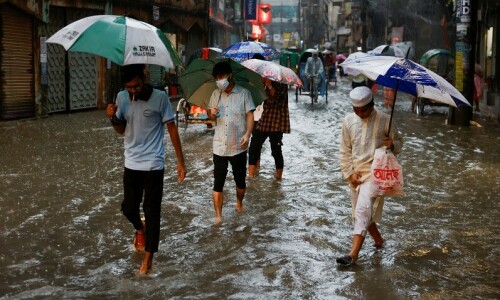CHITTAGONG: Twenty-four people died after a cyclone slammed into Bangladesh on Monday night, forcing the evacuation of about a million people from their homes.
Cyclones _ the equivalent of hurricanes in the Atlantic or typhoons in the Pacific _ are a regular menace in the region but scientists say climate change is likely making them more intense and frequent.
Cyclone Sitrang made landfall in southern Bangladesh late on Monday, but authorities managed to get about a million people to safety before the monster weather system hit.
Around 10 million people were without power in districts along the coast on Tuesday, while schools were shut across much of the country’s south.
Police and government officials said 24 people died, mostly after they were hit by falling trees, with two dying in the north on the Jamuna River when their boat sank in squally weather.
A Myanmar national working on a ship also died by falling off the deck, an official said.
“We still have not got all the reports of damage,” government official Jebun Nahar said.
Eight people are missing from a dredging boat that sank during the storm late on Monday night in the Bay of Bengal, near the country’s largest industrial park at Mirsarai, regional fire department chief Abdullah Pasha said.
“Strong wind flipped the dredger and it sank instantly in the Bay of Bengal,” he said, adding that divers were searching for survivors.
People evacuated from low-lying regions such as remote islands and river banks were moved to thousands of multi-storey cyclone shelters.
“They spent the night in cyclone shelters. And this morning many are heading back to their homes,” Mohammad Ahsan, a government official, said.
Nearly 10,000 homes were either “destroyed or damaged” in the storm and around 1,000 shrimp farms had been washed away in floods, he added.
In some cases police had to cajole villagers who were reluctant to abandon their homes.
Trees were uprooted as far away as the capital Dhaka, hundreds of kilometres from the storm’s centre.
Heavy rains lashed much of the country, flooding cities such as Dhaka, Khulna and Barisal — which took on 324 millimetres of rainfall on Monday.
About 33,000 Rohingya refugees from Myanmar, controversially relocated from the mainland to a storm-prone island in the Bay of Bengal, were ordered to stay indoors, but there were no reports of casualties or damage.
Panic and snakes
The cyclone downed trees and brought widespread panic to the southern island of Maheshkhali after power and telecoms were cut.
“Such was the power of the wind we could not sleep in the night because of the fear that our homes will be destroyed. Snakes entered many homes. Water also inundated many homes,” said Tahmidul Islam, 25, a resident of Maheshkhali.
In the worst-affected Barisal region, teeming rains and heavy winds wreaked havoc on vegetable farms, district administrator Aminul Ahsan said.
In the neighbouring Indian state of West Bengal, thousands of people were evacuated to more than 100 relief centres, officials said, but there were no reports of damage and people started returning home on Tuesday.
Last year, more than a million people were evacuated along India’s east coast before cyclone Yaas battered the area with winds gusting up to 155 kilometres an hour.
Cyclone Amphan, the second “super cyclone” recorded over the Bay of Bengal, killed more than 100 people in Bangladesh and India and affected millions when it hit in 2020.
In recent years, better forecasting and more effective evacuation planning have dramatically reduced the death toll from such storms.
The worst recorded, in 1970, killed hundreds of thousands of people.
Published in Dawn, October 26th, 2022
















































